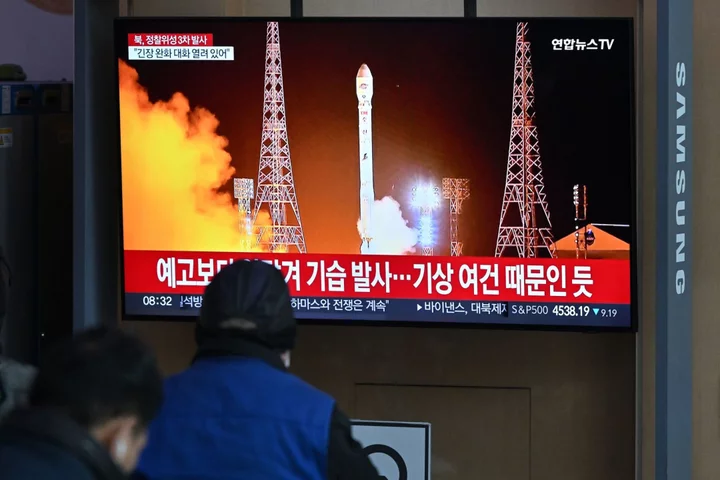North Korea said it is ending an agreement aimed at reducing military tensions with the South, a sign ties are fraying after Pyongyang placed a spy satellite into orbit for the first time.
North Korea vowed that “our army will never be bound” by the 2018 agreement, the official Korean Central News Agency reported Thursday, adding that it “will immediately restore all military measures that have been halted.”
It would “deploy more powerful armed forces and new military hardware” in the area along the border separating it from South Korea, it added.
South Korea vowed to punish the North “immediately, strongly and to the end” based on its defense partnership with the US, if the North engages in further provocations, a spokesman for the Defense Ministry in Seoul said at a regular briefing.
The heightened tensions come after North Korea appeared to successfully place a spy satellite into orbit, putting leader Kim Jong Un closer to his goal of deploying an array of reconnaissance probes allowing him to monitor US forces in the region. Kim oversaw the latest launch, and his state media said the country wants to fire off several more probes within a short period of time.
See: North Korea Satellite Likely Entered Orbit, South Korea Says
Adding to the renewed strains, North Korea fired a ballistic missile toward waters to the east of the peninsula around 11:05 p.m. Wednesday, though the launch appears to have failed, South Korea’s Joint Chiefs of Staff said in a text message.
Missile failures have been rare under Kim. The last one took place about a year ago when North Korea launched a suspected intercontinental ballistic missile from an area near Pyongyang. South Korea’s military said it reached an altitude of 1,920 kilometers (1,200 miles) before failure.
Also: How the North Korea Nuclear Threat Keeps Growing: QuickTake
Following the launch of the spy satellite, South Korea suspended parts of a 2018 deal with North Korea intended to ease military tensions along the border. The cabinet in Seoul approved a plan to restore reconnaissance and surveillance activities that were halted under the agreement.
South Korea’s Joint Chiefs of Staff has said that it assessed the satellite entered an orbit but it was unclear whether the device was operational. While officials in Seoul believe a North Korean spy satellite would be rudimentary at best, it could help Pyongyang refine its targeting as it rolls out new missiles designed to deliver nuclear strikes in South Korea and Japan, which host the bulk of America’s military personnel in the region.
Kim has viewed photos of US military facilities in Guam that were taken by the “Malligyong-1” satellite, official media in Pyongyang said.
Marco Langbroek, a lecturer in optical space situational awareness at Delft University of Technology, said that the technical requirement of the launch show that “the North Koreans are now ready for complex launch scenarios and have a versatile rocket system.”
More: North Korea Says Kim Saw Photos of US Bases From Spy Satellite
Group of Seven foreign ministers condemned North Korea for the ballistic missile launch that sent up the spy satellite, saying in a statement that it “poses a grave threat to the peace and stability of the region and beyond.”
The White House also condemned the launch and was working with allies to assess the situation, National Security Council spokesperson Adrienne Watson said.
North Korea is barred by UN Security Council resolutions from conducting ballistic missile tests. The US and its partners have warned that technology derived from North Korea’s space program could be used to advance its ballistic missiles.
--With assistance from Shinhye Kang.
(Updates with comments from South Korea’s defense ministry and G-7 foreign ministers.)
Author: Emily Yamamoto, Seyoon Kim and Jon Herskovitz

